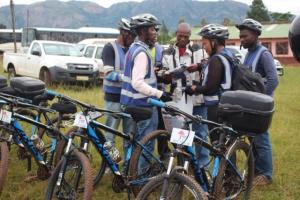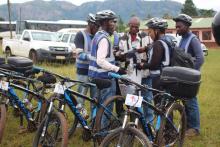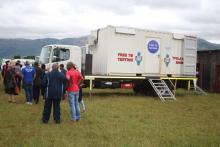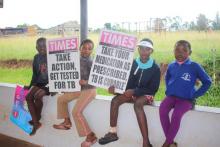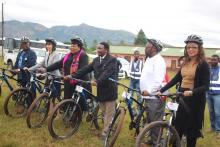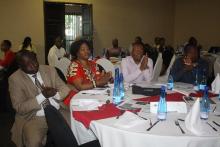World TB Day: Swazis Unite to end TB and HIV
4 April 2017 - Mbabane Swaziland:As Swaziland joined the rest of the world in commemorating World TB Day, the Honourable Minister of Health Senator Sibongile Ndlela-Simelane commissioned the national drug resistance survey. “Both the TB and HIV Drug Resistance Surveys that Swaziland is currently conducting will play a critical role in addressing the effectiveness of regimens prescribed for TB and/or HIV patients” noted the United States of America Ambassador to Swaziland Ms Lisa Peterson. With a TB/HIV co-infection rate of greater than 70% in Swaziland, there is greater need of uniting to end both TB and HIV as one battle that cannot be won unless the other is equally addressed.
The World Health Organization Country (WHO) Representative Dr Tigest Ketsela Mengestu noted that the main issue is that people are being left behind, especially vulnerable populations, those living in poverty, the elderly, women and children on the side-lines of society and those whose work settings put them at risk, such as miners.
Dr Mengestu said as per the theme dictates: “UNITE TO END TB” “Leaving no one behind”, no one should needlessly die of TB. She noted that the theme was in line with the United Nations Sustainable Development Goals (SDGs) and the WHO End TB Strategy. Speaking during the World TB Day commemoration at Lobamba Lomdzala Inkhundla on 25 March, Dr Mengestu said that the theme highlights the fact that we need to work together to eliminate this deadly disease. “This World TB Day, we want to make sure that everyone who needs TB treatment and care… gets it, especially children; that everyone who gets TB treatment …takes it and that everyone who offers treatment, care and support… makes sure that no one is left behind,” said Dr Mengestu.
Hundreds of Swazis led by the uniformed forces band marched through the streets of Lobamba during the commemoration in creating awareness about TB. World TB Day is an opportunity to recognise the achievements in TB prevention and control, and also to renew our commitment to eliminating the disease. This event was preceded by the TB research seminar which was held at the Happy Valley Hotel on the 24th of March. The seminar brought together different stakeholders with the aim of bringing everyone on board the fight against TB.
During the community event, Honorable Sibongile Ndlela-Simelane stated that the country has engaged in a number of interventions to passively find TB cases through all health care facilities. She stated however, that a declining number of notified cases has been witnessed over the past few years . This might mean that there are pockets of TB cases in the communities that are being missed . “In light of the above, it was clearly evident that as a country we needed to engage a robust response to actively find the missed cases hence the deployment of Active Case Finders (ACF) in all the chiefdoms of the country,” she said. The ACFs move from door to door looking for TB cases in all homesteads and the minister revealed that so far they have been able to identify an estimated 108 cases that could have been missed through passive case finding.
Further, the minister unveiled a E2 million mobile unit which has been procured through financial support from the Global Fund. She explained that the mobile unit will serve as an outreach to hard-to-reach areas and underserved communities. The unit is fully equipped as it comes with a digital X-ray and Gene-Xpert machines for diagnosing TB on site and people will be able to recieve their TB results immediately. This is aimed at rapid and timely initiation of treatment to all people affected by TB.
Honourable Ndlela-Simelane highlighted that Swaziland is one of the few countries that have responded to the global directive of taking care of children with TB. She explained that the country is one of the few countries to ensure that equipment that targets at children has been secured and has made drugs for children a priority. Furthermore, health care workers have been trained to use the procured equipment. “As a country we want to ensure that children benefit from new scientific innovations of TB care as the saying goes “bangumliba loya embili” (children are the future of the country). The country is intensifying the diagnosis of TB in all children particularly those that are under five years and those directly living with cases of TB,” she said.
The country has also responded to the introduction of new diagnostics and quality drugs for drug resistant TB (DR-TB). Swaziland is one of the few countries to introduce the second line regime. The new diagnostic tests diagnose rapidly and enhance treatment initiation for the people of Swaziland. This has been coupled with a strong decentralisation of DR-TB services to all the four regions of the country.
The minister also mentioned that the country has introduced new drugs in the treatment of Multidrug resistant TB (MDR-TB (Delaminid and Bedaquiline). These drugs improve the treatment of MDR-TB in terms of side effects and the quality of life for those affected by the disease.
Adding, the minister said: “There has also been an introduction of a short course regimen of 9-12 months as opposed to the 18-24 months for DR-TB treatment and Swaziland is among the first countries in Africa to introduce this short course regimen. The short course has been seen to greatly improve adherence to treatment, is cost effective and greatly reduces infectiousness to other people,” she said.
___________________________________________
For more information contact :
Dr Kevin Makadzange – HPR officer ; Phone : (+268) 24042928, 24049635, fax : (+268) 2404 4566 email: %20makadzangek [at] who.inttarget="_blank"
Below :
1 - The Active Case Finders having a discussion.
2 - The mobile unit which will serve as an outreach unit.
3 - Uniformed forces leading the march
4 - The young ones displaying placards with TB messages used during the march
5 - The Minister viewing the bicycles used by the ACFs. She is joined by the WR, US Ambassador and Lobamba Lomdzala community leaders
6 - Stakeholders clapping hands during the TB research seminar at Happy Valley Hotel.




